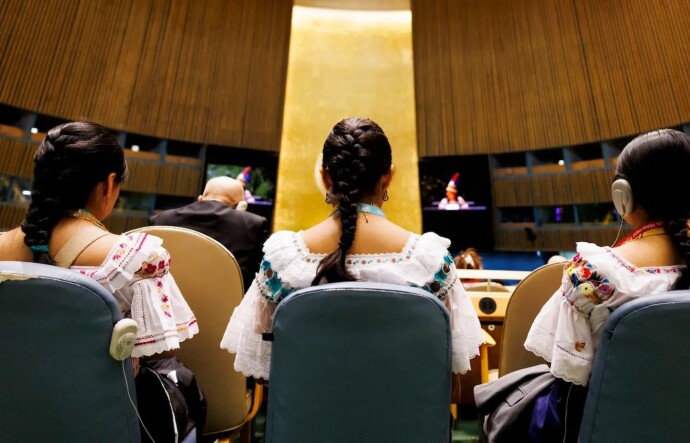Topline:
The United Nations has opened up a new round of funding to support Indigenous peoples to attend two major convenings in New York City and Geneva next year.
Why it matters: Representatives of Indigenous nations and peoples from all over the world gather to discuss issues ranging from language loss to climate change. It’s a unique opportunity for Indigenous advocates to bring global attention to the challenges facing their communities, strengthen relationships with other Native peoples, and influence global policy.
About the meetings: This year’s theme is focused on the health of Indigenous peoples, particularly in the context of conflict, and participants are also expected to discuss a report on the rights of Indigenous peoples in the midst of the climate crisis. The United Nations Permanent Forum on Indigenous Issues or UNPFII, happens every year in New York and is scheduled for April 20-May 1, 2026. The Expert Mechanism on the Rights of Indigenous Peoples or EMRIP, holds another convening scheduled for July 13-17 next summer in Geneva.
The United Nations has opened up a new round of funding to support Indigenous peoples to attend two major convenings in New York City and Geneva next year.
The United Nations Permanent Forum on Indigenous Issues, or UNPFII, happens every year in New York and is scheduled for April 20-May 1, 2026. Representatives of Indigenous nations and peoples from all over the world gather to discuss issues ranging from language loss to climate change. It’s a unique opportunity for Indigenous advocates to bring global attention to the challenges facing their communities, strengthen relationships with other Native peoples, and influence global policy. This year’s theme is focused on the health of Indigenous peoples, particularly in the context of conflict, and participants are also expected to discuss a report on the rights of Indigenous peoples in the midst of the climate crisis.
The Expert Mechanism on the Rights of Indigenous Peoples, or EMRIP, holds another convening scheduled for July 13-17 next summer in Geneva. The Expert Mechanism is made up of seven experts appointed by the U.N. Human Rights Council, and its annual meeting provides another chance for Indigenous advocates to raise concerns about rights violations.
The U.N. Voluntary Fund for Indigenous Peoples has limited grant funding to pay for attendees’ transportation, accommodation, and registration fees for either of these gatherings. The Voluntary Fund wants to hear from applicants who have a track record of advocating on behalf of their communities and are eager to share their perspectives internationally.
“Your community’s wisdom and advocacy deserve to be heard where decisions affecting Indigenous peoples are made,” the Voluntary Fund’s call for applications says. “This fund exists specifically to ensure financial barriers don’t silence Indigenous voices in international spaces.”
What to know about the application process
- You can apply online
- You will need a resume, a copy of your passport, and a letter of recommendation from a leader in your community or organization
- The deadline is Oct. 31
- Applicants with financial need will have priority as well as those who can show they represent their communities and have a record of working on Indigenous rights issues
- People with disabilities and LGBTQ+ individuals are especially encouraged to apply
- For more information on the criteria and process, check out the call for applications
- Further questions can be directed to Morse Caoagas Flores, secretary of the U.N. Voluntary Fund for Indigenous Peoples, at morse.flores@un.org.
Curious about what happens at UNPFII?
Grist and other Indigenous outlets cover the U.N. Permanent Forum in New York every year, and our archives can help you learn about what to expect:
The United Nations and several nongovernmental organizations also offer training sessions for people who want to learn about how to effectively engage at the forum. Last year, Project Access Indigenous Partnership held training sessions for both UNPFII and EMRIP in partnership with the U.N. The organization also provides a free, self-directed online course on Indigenous advocacy at the United Nations.
In his recent book, Nothing More of This Land, Aquinnah Wampanoag writer and former Grist fellow Joseph Lee wrote about what it was like to attend the permanent forum, where he observed both the potential depth and limitations of global Indigenous advocacy.
“The forum itself, which has been around for over 20 years, came after decades of international advocacy for Indigenous people to have a more prominent role on the international stage,” he wrote. “There’s nowhere else in the world where so many Indigenous people from around the world can come together to share stories, ideas, and community with one another.”
This article originally appeared in Grist at https://grist.org/indigenous/want-to-go-to-the-uns-biggest-gathering-of-indigenous-peoples-heres-how/.
Grist is a nonprofit, independent media organization dedicated to telling stories of climate solutions and a just future. Learn more at Grist.org


